
Bookkeeper360 offers a pay-as-you-go plan that costs $125 per hour of on-demand bookkeeping support. It’s an ideal plan for businesses that need minimal monthly support, though if you want more than two hours of help a month, you’ll save more money simply going with a service like inDinero or Bench.co. And on the accounting software front, Bookkeeper360 syncs with both Xero and QuickBooks Online. Starting a virtual accounting firm provides a flexible career and the freedom to choose where you work and who you want to work with. To help you decide whether this is the right move, here’s what you need to know about becoming a virtual accountant, the benefits of starting a virtual accounting firm, and how to get started.
The Role of Technology in Virtual CPA Services
With all this tedious accounting work,1 this can be quite a hassle for organizations as this is prone to mistakes, especially when dealing with multiple clients and invoices. There are many complexities when dealing with tax computations, managing track records, and other sophisticated financing work. Higher-level accountants are best utilized when they have a voice in the room. Their familiarity with the numbers can drive strong recommendations that are information-based. Even if they are not in leadership meetings for decisions such as hiring periods or service changes, their perspective and information should be considered part of good meeting preparation. To become one, you need strong math skills, proficiency in accounting software, and effective communication abilities.
Overcoming the Challenges of Becoming a Virtual Accountant

Data-Driven Insights for Informed Decision-MakingAdvanced data analytics tools empower virtual CPAs to extract valuable insights from vast amounts of financial data. By analyzing trends, identifying cost-saving opportunities, and formulating data-driven strategies, accountants can offer clients informed recommendations for improving financial performance. Data-driven decision-making enhances the accuracy and effectiveness of financial planning and budgeting. It ledger account is important to note that both traditional accounting firms and virtual CPA firms have their own strengths and considerations.
What Should an Accountant Do for a Small Business?
- Likewise, if your virtual accountant is communicative, friendly, and professional, they are more likely to deliver a positive experience.
- These accounts streamline payments, improve fund tracking, and enhance security without requiring a physical bank branch.
- The good news is that many virtual accountants have learned to overcome these challenges.
- Ultimately, organizations should carefully assess their requirements and consider the advantages offered by each approach to make an informed decision.
- There are a few key signs that your business can benefit from going paperless.
However, the accounting profession is moving away from charging by the hour in favor of subscription pricing. Adding on higher value CFO services, advisory services, budgeting, and cash flow planning might allow you to earn even more. The controller’s role is to produce meaningful financial statements, formalize month-end close processes, reconcile balance sheets, maintain forecasts, and provide insights on KPIs. It drives informed decision-making to grow your company, not just numbers to reflect growth. Deciding between virtual and outsourced accounting depends on your business’s needs and budget.

Virtual accounting FAQ

Check out our list of the year’s best accounting software for small businesses to get started. Prices start at $500 a month for the Essential plan, which is geared towards startups that use cash-basis accounting. If you use accrual-basis accounting, you’ll need the Growth plan, which starts at $990 a month. And the Executive plan, which is built for larger companies that need CFO services, has custom pricing. Our consultation services are designed to provide you with strategic insights and guidance. According to Thumbtack, accountants charge $30 to $300 per hour, depending on the services they offer and the size of the businesses they serve.
If you’re looking to reduce your accounting costs while maintaining access to professional financial services, a virtual accountant might be the perfect solution. Many virtual accounting firms offer services across different time zones and even provide 24/7 access to your financial data. This flexibility, combined with the ability to connect to your accounting software from anywhere, makes virtual accounting an excellent choice for businesses operating in today’s digital environment.

Businesses that operate internationally can receive payments in multiple currencies, reducing conversion costs and delays. Used for fund collection and management related to events, crowdfunding, or limited-time projects. Derek Gallimore has been in business for 20 years, outsourcing for over eight years, and has been living in Manila (the heart of global outsourcing) since 2014. Derek is Car Dealership Accounting the founder and CEO of Outsource Accelerator, and is regarded as a leading expert on all things outsourcing. With 15,000+ articles, and 2,500+ firms, the platform covers all major outsourcing destinations, including the Philippines, India, Colombia, and others.
- Accountants can work remotely by using cloud-based software to manage financial data securely.
- In this guide, we will explore the concept, functionality, benefits, and practical applications of virtual bank accounts in India.
- The alternative to manual processes and paper documentation is a paperless, digital approach.
- If your potential accountant says they have worked in your industry, ask for references, and follow through to make sure they truly understand your specific needs.
- Virtual accounting is cheaper, while outsourced accounting offers more expertise and support.
According to Indeed, the virtual accountant average salary for an accountant in 2023 is $61,830. According to the United States Bureau of Labor Statistics, total benefit compensation averages 29.5% of the total cost of compensation for an employee in the private industry. A controller averages $152,864 annually ($107,769 in salary, according to Indeed). Full-time accountants are pivotal to a growing business; however, many companies hire full-time too early, creating tight budgets.
